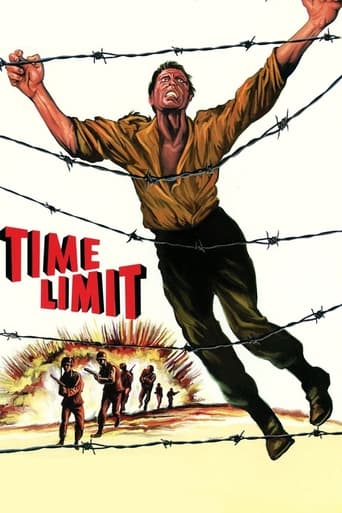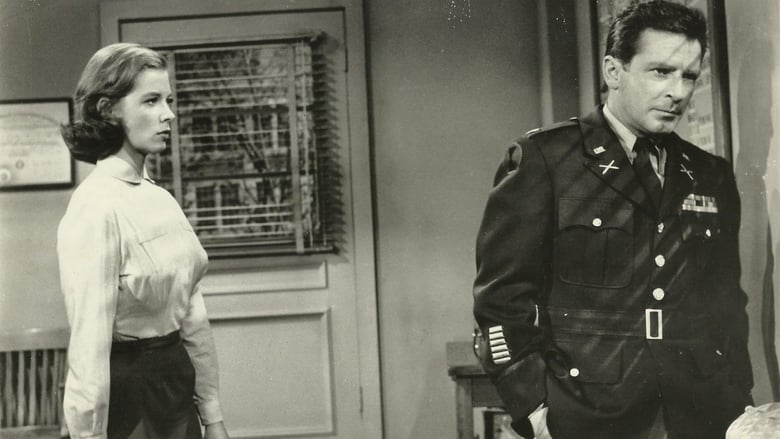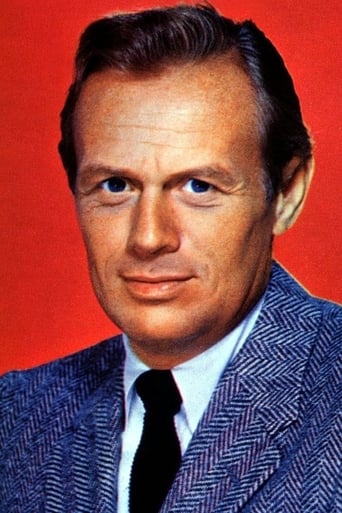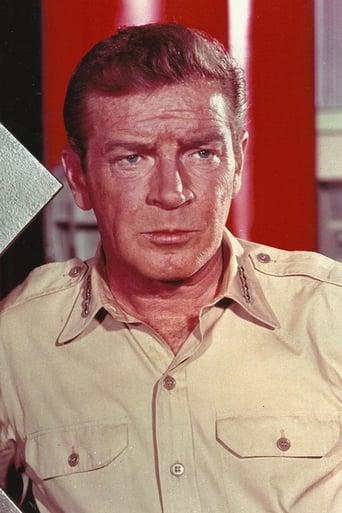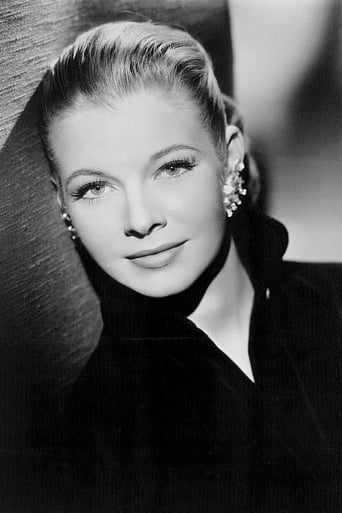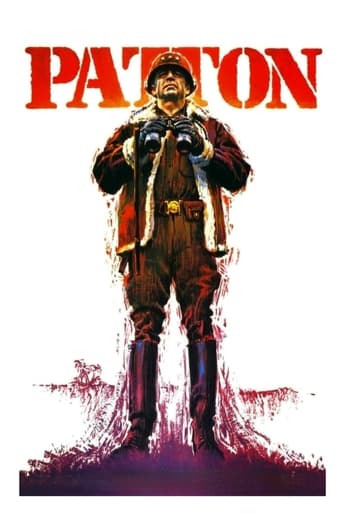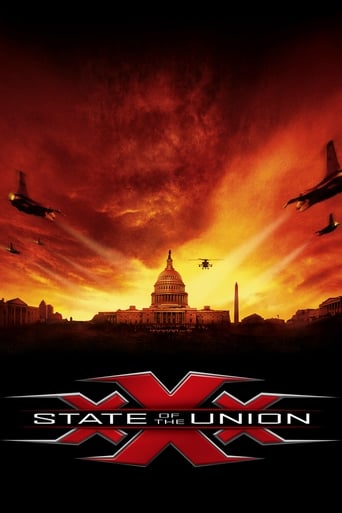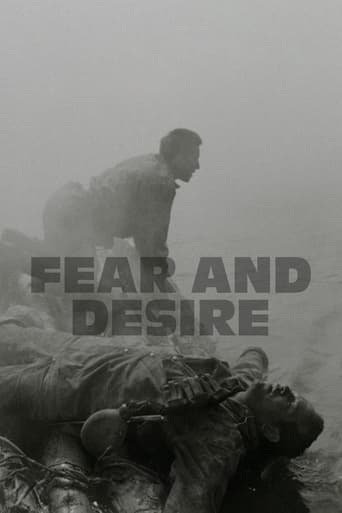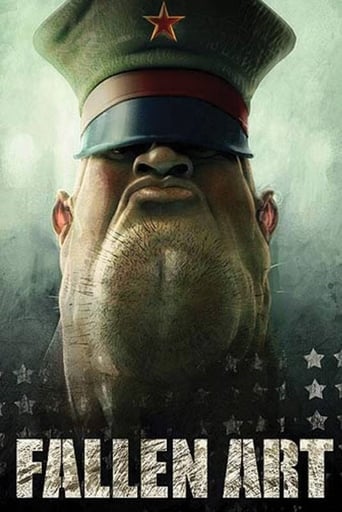Time Limit (1957)
Military investigator Colonel Edwards is assigned a case involving Major Cargill, a Korean War POW who is accused of treason. Although Cargill admits his guilt and Edwards' superiors are impatiently pushing Edwards to move this case to court martial, Edwards becomes convinced of Cargill's innocence.
Watch Trailer
Cast


Similar titles
Reviews
Wonderful Movie
I like movies that are aware of what they are selling... without [any] greater aspirations than to make people laugh and that's it.
if their story seems completely bonkers, almost like a feverish work of fiction, you ain't heard nothing yet.
A great movie, one of the best of this year. There was a bit of confusion at one point in the plot, but nothing serious.
In the 1950s, actor Khigh Dhiegh created a niche playing evil Chinese or North Koreans who were experts at psychological warfare and evil! While he was wonderful to watch and made a great recurring villain on "Hawaii Five-O" and made appearances in the original "Manchurian Candidate" (playing essentially the same sort of fun-loving guy), few would have realized that he had no Asian blood whatsoever! Despite his evil chubby Fu Manchu-like look, he was actually an American-born guy with North African roots! Despite this, I really, really loved watching him every chance I got--and I was excited to see him in a small part in "Time Limit". Quite simply, he was great at being bad! This film is set just after the Korean War. A Major (Richard Widmark) has been assigned to defend a Colonel (Richard Basehart) who is being tried for aiding the enemy. It seems that while in a prisoner of war camp, Basehart was forced to make anti-American statements which were used as propaganda. Why would he do this--especially since he was a good officer?! Perhaps the evil Khigh Dhiegh found some way to brainwash Basehart. Unfortunately, they don't know because Basehart won't talk--and Widmark is having a devil of a time trying to defend a man who won't help himself. So, despite his client's wishes, he wants to dig deeper and interview a variety of people to get to the heart of it.Overall, the film is very well-acted and the plot takes a very interesting turn near the end. Tune in to this one and see for yourself--it's worth seeing.
***SPOILERS*** Shocking drama of what went on in the North Korean POW camps and how it turned men into mindless and obedient zombies in them being brainwashed by the North Koreans and their Red Chinese allies.The case in point in the movie is that of the almost brain-dead in him not caring about what he's facing Maj. William Cargill, Richard Basehart. The Major has been charged with high treason in cooperating with his North Korean captors back in 1951 when he was imprisoned by them as a POW. It was then that Maj. Cargill made false claims in both writing as well as broadcasts on Radio Pyongyang claiming that the US and UN were using germ bombs or bacteriological warfare against the helpless North Korean civilians as well as soldiers!With US Army Col. William Edwards, Richard Widmark, handing his case he gets no help from Maj. Cargill in him trying to defend himself even if convicted of his crimes he may well end up facing a firing squad. Knowing that something just isn't right with this puzzling case Col. Edwards digs deep down into what's behind Maj. Cargill's strange behavior by interviewing the men, his fellow POWS, who were in the North Korean POW camp with him. It's when Col. Edwards comes to interviewing Let. Miller, Rip Torn, that he strikes a nerve in what exactly is behind Maj. Cargill's noncooperation with him in not wanting any defense provided by him or the US Military. Something went on in that prison camp between both the captured US POWS and their North Korean captors headed by the smiling and sinister North Korean Col. Kim, Khigh Dhiegh, that went beyond anything in the mistreating of prisoner of war! Something so mind boggling and evil that it turned Maj. Cargill into something that he never would have dreamed of being! Even with a gun pointed to his skull! A traitor to his country!***SPOILERS*** Even though it's old hat now back then in the early 1950's brainwashing was something that most Americans never heard of or even contemplated. It was those brainwashing tactics, far more then torture, conducted by the North Koreans and Red Chinese on US and UN troops captured by them that drove men like Maj. Cargill to grudgingly cooperate with them. In Maj. Cargill case it was for the safety and lives of his men not his own that made him do it! And in the end it was that shocking revelation that had Col. Edwards who was to prosecute Maj. Cargill for treason to completely change him mind! Col. Edwards against the the advice of his superior Let. Gen. Connors, Carl Berton Reid, who's own son Capt. Joe Connors, Yale Wexler, was one of those in the prison camp along with Maj. Cargill, and who died there, decided to defend not prosecute Maj. Cargill even if it ends up costing him his career in the US Army!P.S The movie "Time Limit" was the only movie ever directed by actor Karl Malden who also had a cameo part in it as one of the POWS in the North Korean prison camp.
The post-war era brought a new-fangled maturity to Hollywood – largely by way of talent coming in from the rival fields of theater and television (and expressed particularly in intense social dramas, often with a dash of psychology) – which considerably invigorated the style of Hollywood film-making in general and even helped towards achieving a more liberal censorship.The film under review actually bears an affinity to four of the very finest efforts made during this era: Elia Kazan’s ON THE WATERFRONT (1954) – in its depiction of revenge within a close-knit outfit upon a stool pigeon in their midst (which had featured TIME LIMIT director Malden as an actor and Martin Balsam, who also appears here, in a bit part); Stanley Kubrick’s PATHS OF GLORY (1957) – in which army attorney Kirk Douglas also faces opposition (for his meticulous defence) from his superior officers who want to escape personal embarrassment by hastily doing away with the case in question; Sidney Lumet’s TWELVE ANGRY MEN (1957; again with Balsam) – similarly dealing with an investigation packed with twists, as well as not technically being a courtroomer; and John Frankenheimer’s THE MANCHURIAN CANDIDATE (1962) – likewise set during the Korean War and involving brainwashing (plus also featuring Khigh Deigh).Of course, it’s not quite on the same level of those milestone titles but definitely emerges as an underrated little film – its very sensitive nature (presenting all sides of the equation i.e. duty to rank and country-vs.-loyalty to, and consideration for, one’s fellow man but then leaving the audience to make up its own mind) possibly hindered any chance at Oscar glory, which would have been entirely deserving…or, perhaps, it was simply because there were already two courtroom dramas commanding attention at that year’s ceremony (the afore-mentioned TWELVE ANGRY MEN and Billy Wilder’s equally brilliant WITNESS FOR THE PROSECUTION) – though, ironically, both remained empty-handed after all! Malden’s sole directing effort is impressive (though, again, not up to, say, Charles Laughton’s THE NIGHT OF THE HUNTER [1955]) and one that gains excellent performances from practically the entire cast. Richard Widmark – a Hollywood star who wasn’t afraid to appear in meaningful films – personally co-produced this one (while others in similar vein he was featured in were NO WAY OUT [1950], JUDGMENT AT NUREMBERG [1961], CHEYENNE AUTUMN [1964] and THE BEDFORD INCIDENT [1965]). Richard Basehart is typically anxious (and compelling) as the soldier accused of treason; he, at least, was awarded with a BAFTA nomination for his work here. Pretty Dolores Michaels is very engaging as Widmark’s sympathetic aide; the only other significant female role, turning up in just one scene, is played by June Lockhart: knowing her chiefly from SHE-WOLF OF London (1946), I was surprised to see her in such a demanding part (at one point, frankly confessing to Widmark her marital problems with Basehart) – but she fills it admirably. Martin Balsam’s character, as Widmark’s well-meaning but more often intrusive colleague, provides the sole concession to humor here – and, consequently, is entirely welcome for it. The film’s compactness, based as it is on a stage play, necessitates that it focuses on just two of the testimonies given by the sixteen soldiers involved in the case being tried – the other, apart from Basehart himself, offers a meaty early role for Rip Torn (which, of course, heralds an eventual revelation concerning his particular character). Carl Benton Reid appears as Widmark’s superior and close friend, a by-the-book military officer of the old school whose integrity is shattered by the end of the film in view of his own son’s unforeseen behavior while in captivity.A gripping, thought-provoking and emotionally-draining experience (in spite of the horrid quality of the VHS version I watched – copied from Cable TV which, at the time, was suffering from bad reception!), I can’t figure out what’s holding this from getting a decent DVD release: hopefully, Widmark’s recent passing will start the ball rolling in this regard. Ultimately, I have to admit that my response to TIME LIMIT was so strong because it may have been influenced by my own current personal situation: notoriety following the violent death of a relative in the course of some shady activity – and which goes hand in hand with the film’s assertion that a man’s whole life, irrespective of how it was spent, will be judged by people who can’t know the whole story on the strength of that single reckless and deplorable act...
I had seen Time Limit three times before, always greatly admiring and appreciating the taut court-martial drama. I find it unfortunate that Malden never took another director's turn after such an impressive debut. The acting and direction still hold up well with tour-de-force performances by Basehart and Widmark. These are complemented nicely by dead-on portrayals by Carl Benton Reid, Rip Torn, Martin Balsam, and Yale Wexler as far less humane military characters. Dolores Costello and June Lockhart also give strong performances.But, the reason I write this today is to comment upon how timely Time Limit is to today's POW controversies. In this regard, I consider the 1962 film "the Hook" with Kirk Douglas almost as a companion piece. The questions are the same. How far should a soldier suppress his humanity in the name of the Army Code? How accountable should a soldier be held who defies the code in order to act in accordance with his conscience? How accountable should a soldier be held who obeys orders later judged to be inhumane? All these are central issues in wake of the recent Abu Gharib controversies. Time Limit does an excellent job of examining these dilemmas and convincing those of us who weren't already convinced that there are no easy answers. War, by its nature, is an inhumane activity, ordered by humans and executed by humans who to accomplish their orders must deny within themselves subjugate the very humanity that gives each of us his or her purpose in life. Time Limit and The Hook both provide thoughtful and fairly objective examinations of the issues involved.Time Limit has always been worth watching. Its renewed relevancy just makes it even more so.

